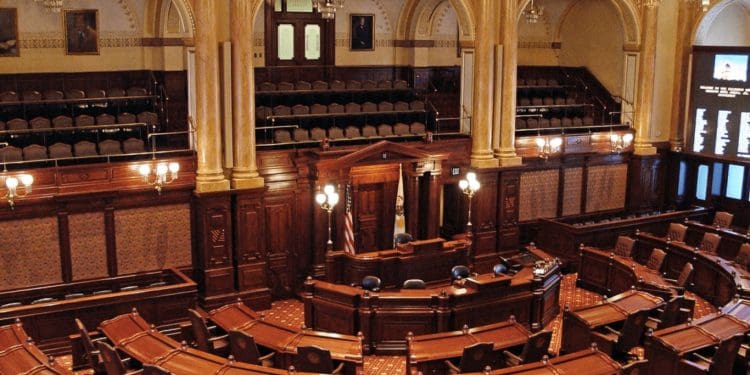The bill was described as “the most unworkable state law” regarding blockchain and cryptocurrencies by Florida-based attorney Drew Hinkes.
- A senator from Illinois quietly introduced the Senate Bill on February 9 into the Illinois legislature.
- Following the proposed legislation, a smart contract-based blockchain transaction could be modified or annulled at the request of the court.
Senate Bill
The cryptocurrency industry has mocked a recently filed Illinois Senate Bill for its “unworkable” proposals to compel blockchain miners and validators to carry out “impossible things,” such as undoing transactions if so, directed by a state court.
When Florida-based attorney Drew Hinkes tweeted about the Senate Bill on February 19, the public only recently learned about it. Illinois senator Robert Peters quietly introduced the Senate Bill into the Illinois senate on February 9.
In response to a legitimate request from the attorney general or a state’s attorney made by Illinois law, the “Digital Property Protection-and-Law-Enforcement Act” would grant the courts the authority to order a blockchain transaction handled by a smart contract to be changed or revoked.
Unworkable State Law
The law would apply to any “blockchain networks that execute a blockchain transaction originating in the State.” In Hinkes’ words, the law is “the most unworkable state law” he has ever seen in terms of blockchain technology and cryptocurrencies.
“This startling turnabout for a state that was formerly pro-innovation is shocking. As a substitute, we now have what may be the most inapplicable state law relating to cryptocurrency and blockchain that I have ever seen,” he tweeted.
According to the proposed legislation, blockchain validators and miners who disobey court orders risk paying a punishment ranging from $5,000 to $10,000. Hinkes acknowledged the necessity for legislation to improve consumer protection, but he said that the senator’s measure would be “difficult” for miners and validators to follow.
Hinkes was also astonished to learn that miners or validators working on a blockchain network that “has not adopted reasonably available methods” to obey the court orders would have “no defense” available to them. Additionally, it appears that the bill requires “any individual using a smart contract to deliver goods and services” to include code that can be used to comply with court orders in the smart contract.
Any individual who uses a smart contract to deliver goods or services in this State must include a smart contract code that can enforce court decisions about the smart contract. A similar mockery of the law has been returned from other cryptocurrency enthusiasts.
Analysts’ Take on the Matter
On February 19, cryptocurrency analyst “foobar” said that it would be necessary to — somehow — change court-ordered transactions “without having the private key” of the participants, which he found to be “hilarious.”
According to Gabriel Shapiro, an attorney and general counsel at investment firm Delphi Labs, the bill would essentially outlaw immutability on blockchains. On February 19, Southern Methodist University School of Law assistant professor Carla Reyes claimed that legislators should only file measures if they are familiar with the technology.
Although distributed ledgers and blockchains have the virtue of immutability, the Peters-sponsored measure argued that these networks lack a court-accessible enforcement mechanism. Because of this, enforcing legal rights in digital property is frequently impossible due to the high cost, and most blockchain offenses go unpunished.
Conclusion
The measurements indicated that fraud and error were the two scenarios in which Illinois courts could order a blockchain transaction to be sent back to the victim or original sender. If users misplace their private keys, the bill also aims to assist them in getting their valuables back. Although the bill was only presented on February 9, it must first go through three separate committee hearings to be “read” and approved before being sent to Illinois Governor Jay Pritzker to be formally signed into law. The first reading took place on the same day that Peters presented it to the Illinois General Assembly. The bill’s provisions would go into effect 30 days after becoming law if it were ever passed.














